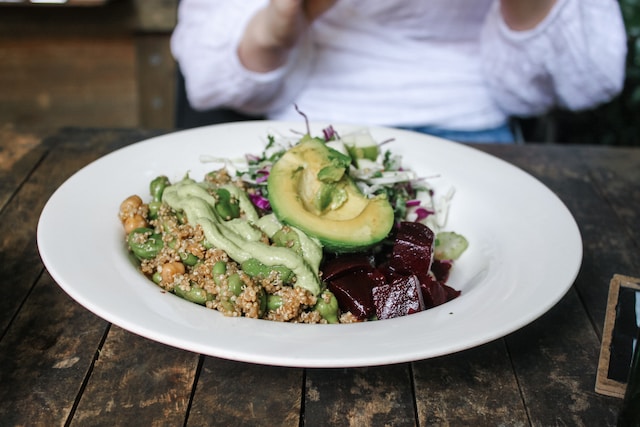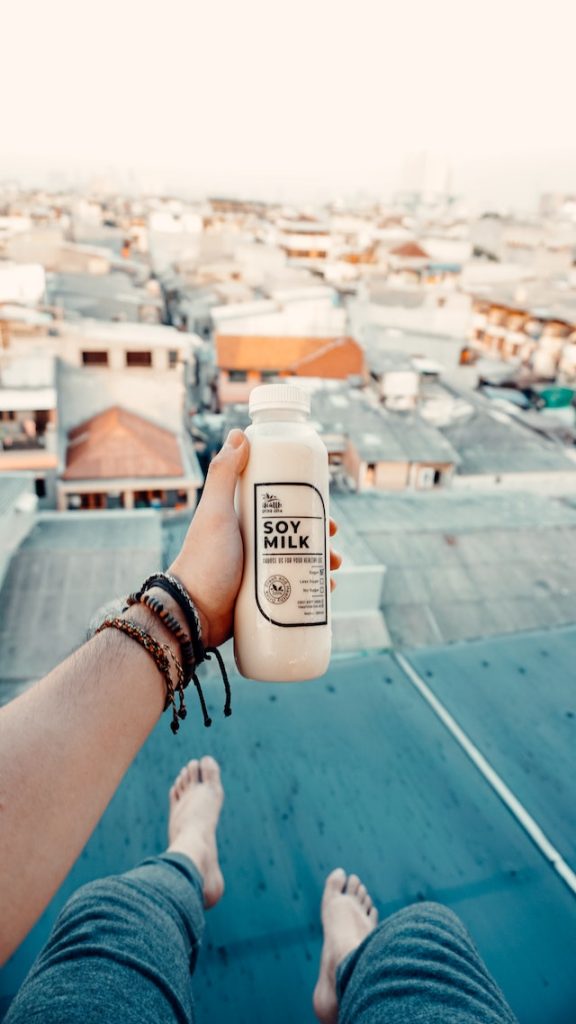
Protein plays a vital role in building and maintaining muscle mass. For those following a vegan lifestyle, ensuring an adequate protein intake might seem like a daunting task. However, today’s market is flooded with plant-based protein options that can easily meet the needs of even the most dedicated plant-powered individuals. The misconception that animal products are the sole providers of high-quality protein has long been debunked.
In fact, vegan protein sources offer a plethora of benefits, not just for muscle growth but for overall health as well.
Plant-Based Protein Basics
The concept of plant-based protein sources might raise eyebrows in a world where the consumption of meat has long been synonymous with muscle building, However, what many fail to realize is that plants possess an astonishing capability to fuel the growth and repair of muscles. Not only are they abundant in essential amino acids, the building blocks of protein, but they also provide a host of other nutrients that are vital for optimal muscle function.
Complete vs. Incomplete Proteins
When it comes to protein, the term “complete” refers to sources that contain all nine essential amino acids, those that the body cannot produce on its own. Traditionally, animal products such as meat and dairy have been considered complete proteins. However, it is entirely possible for vegans to obtain all the essential amino acids through a varied and well-planned plant-based diet.
Some notable plant-based complete protein sources include quinoa, soybeans, hemp seeds, and the often-misunderstood spirulina. These foods not only offer a complete amino acid profile but also provide additional health benefits, making them excellent choices for vegans looking to support muscle growth.
Complementary Proteins and Optimal Pairings
While certain plant-based proteins may be incomplete on their own, combining them strategically can create a complete amino acid profile. This practice is referred to as complementary protein pairing. By incorporating a variety vegan protein sources throughout the day, one can easily meet their protein needs without relying on animal products.
For example, legumes such as beans and lentils, when combined with whole grains like brown rice or quinoa, form complementary pairs that provide a complete range of essential amino acids. Similarly, combining nuts and seeds with legumes or grains can also create balanced protein combinations.
Embracing Diversity in Protein Sources
One of the advantages of a plant-based diet is the vast array of vegan protein sources available. Instead of relying solely on tofu or tempeh, individuals can explore the flavors and textures of various legumes, such as chickpeas, black beans, and red lentils. Additionally, whole grains like amaranth, buckwheat, and millet contribute valuable protein and fiber to support muscle growth and overall health.
Moreover, incorporating nuts, seeds, and their butters, such as almond butter and tahini, provides not only protein but also healthy fats that aid in nutrient absorption. The possibilities are endless when it comes to plant-based proteins, encouraging individuals to embrace culinary creativity.

Supplementing Wisely
While a well-balanced plant-based diet can provide an ample amount of protein for muscle growth, some individuals may still choose to supplement their intake. Plant-based protein powders made from vegan protein sources like peas, brown rice, and hemp are widely available and can be easily incorporated into smoothies, baked goods, or savory dishes.
When selecting a plant-based protein supplement, it is essential to opt for products that are minimally processed and free from artificial additives. Reading ingredient labels and opting for organic or non-GMO options can help ensure a high-quality supplement.
Vegan Protein Sources
Soybeans
Soybeans have long been a staple in Asian cuisines, and for good reason. Not only are they a complete protein source, but they also offer a range of beneficial compounds like phytoestrogens and antioxidants. With a complete amino acid profile, soybeans provide the body with the building blocks it needs to support muscle growth. They are also rich in iron, calcium, and vitamin B-12, making them an excellent option for vegans. From tofu and tempeh to soy milk and edamame, soybeans can be transformed into a multitude of delicious dishes. Experimenting with soy-based recipes opens up a world of culinary delights.
Quinoa
Quinoa, often referred to as the “golden grain,” is a complete protein source that hails from the Andean region of South America. This tiny grain packs a powerful nutritional punch, boasting all nine essential amino acids, making it an ideal choice for vegans looking to support muscle growth.
Quinoa’s versatile nature allows it to be incorporated into various dishes, from savory salads to hearty stews. Its subtle nutty flavor adds depth to any recipe.

Hemp Seeds
Hemp seeds are the tiny, nutrient-dense gems derived from the Cannabis sativa plant. Not to be confused with its psychoactive counterpart, these seeds are legal, safe, and incredibly nutritious. Packed with complete protein and an ideal balance of omega-3 and omega-6 fatty acids, hemp seeds provide a plethora of health benefits. They also contain high levels of fiber, magnesium, and iron. Hemp seeds can be sprinkled on top of salads, blended into smoothies, or incorporated into baked goods. Their mild, nutty flavor adds a pleasant taste and texture to any dish.
The Misunderstood Spirulina
Spirulina is a blue-green algae that has been consumed for centuries due to its incredible nutritional value. It is highly regarded as a complete protein source and a superfood. Spirulina contains an impressive array of essential amino acids, vitamins, and minerals. It is particularly rich in iron, which is essential for oxygen transport and energy production. Spirulina can be added to smoothies, juices, or even used as a natural food coloring. With its earthy taste, it adds a unique twist to any culinary creation.
Legumes and Whole Grains
Legumes and whole grains, when combined, form complementary protein pairs that provide a complete range of essential amino acids. Legumes, such as beans, lentils, and chickpeas, along with whole grains like brown rice and quinoa, offer not only protein but also a plethora of vital nutrients, including fiber, iron, and B vitamins. These protein powerhouses can be transformed into delicious dishes such as lentil soups, chickpea curries, and bean-based burgers. The variety of flavors and textures ensures a delightful dining experience.
Plant-Based Dairy Alternatives
For those following a vegan lifestyle, traditional dairy products are off-limits. Fortunately, the market is now abundant with plant-based dairy alternatives that not only provide a delicious substitute for milk, cheese, and yogurt but also contribute to the daily protein intake.
Almond Milk: Nutty and Nourishing
Almond milk has become a popular choice among vegans due to its creamy texture and pleasant taste. This dairy alternative is made by blending soaked almonds with water and straining the mixture to remove any solids. While almond milk might not be as protein-rich as regular milk, it still provides a valuable source of plant-based protein. Look for unsweetened varieties to avoid added sugars.
Coconut Yogurt
Coconut yogurt is a popular dairy-free alternative that provides a smooth and tangy substitute for traditional yogurt. Made from the flesh of the coconut, this creamy delight is naturally rich in healthy fats, vitamins, and minerals. While the protein content may vary depending on the brand and preparation method, coconut yogurt can still contribute to a vegan’s daily protein needs. Enjoy it on its own or add it to fruit bowls, granola, or smoothies for a protein-packed twist.

Soy Milk
Soy milk has been a staple in vegan households for decades and remains one of the most protein-rich dairy alternatives. Made from soybeans, this creamy beverage is an excellent source of complete protein, offering all the essential amino acids the body needs. Soy milk is also rich in calcium and fortified with vitamins like vitamin D, making it a great choice for bone health. Use it in smoothies, cereals, or baking recipes to boost your protein intake.
Cashew Cheese
Cashew cheese has gained popularity among vegans for its smooth texture and cheesy taste. Made from soaked cashews, nutritional yeast, and seasonings, this plant-based cheese alternative adds a burst of flavor to any dish. While cashew cheese may not be as protein-dense as traditional cheese, it still provides a decent amount of plant-based protein, along with healthy fats and minerals. Spread it on crackers, melt it onto pizzas, or use it as a filling for stuffed vegetables.
When incorporating plant-based dairy alternatives into your diet, it’s essential to opt for unsweetened, fortified varieties to maximize protein and nutrient intake. Experiment with different flavors and brands to find the ones that suit your taste buds. Remember to read ingredient labels to avoid artificial additives or excessive sugars.
Vegan Protein Powders
Vegan protein powders have become increasingly popular as they offer a convenient and effective way to supplement one’s protein intake. Made from vegan protein sources, these powders provide a concentrated dose of protein to support muscle growth and recovery. With an abundance of options available, individuals can choose from a variety of flavors and sources that suit their taste preferences and dietary needs.
- Pea Protein Powder: Pea protein powder is derived from yellow split peas and is one of the most popular vegan protein powders on the market. It contains all nine essential amino acids, including branched-chain amino acids (BCAAs), which are crucial for muscle repair and growth. Pea protein is easily digestible and hypoallergenic, making it an ideal choice for those with sensitive stomachs. This powder is often unflavored or comes in various flavors such as chocolate and vanilla, allowing individuals to easily incorporate it into their favorite recipes and smoothies.
- Rice Protein Powder: Rice protein powder is made from brown rice, providing a complete amino acid profile for optimal muscle growth. It is easily digestible and suitable for those with various dietary restrictions, including gluten and dairy sensitivities. Rice protein powder is often blended with other plant-based proteins, such as pea protein, for a well-rounded nutritional profile. This powder is available in different flavors and can be added to shakes, baked goods, or used as a post-workout recovery drink.
- Hemp Protein Powder: It is rich in essential fatty acids, including omega-3 and omega-6, which support overall health and inflammation reduction. Hemp protein is also a great source of fiber, aiding in digestion and promoting satiety. This powder has a slightly nutty flavor and is often used in smoothies, energy bars, or sprinkled on top of cereals and salads.
- Sacha Inchi Protein Powder: Sacha Inchi protein powder comes from the seeds of the sacha inchi plant, also known as the Inca peanut. It is a complete protein source, containing all essential amino acids, making it ideal for muscle growth and repair. Sacha inchi protein powder is also rich in omega-3 fatty acids, which support brain health and reduce inflammation. This powder has a mild, nutty flavor and can be used in smoothies, energy balls, or even added to homemade protein bars.
Nutritional Considerations
When relying on vegan protein sources for muscle growth, it’s important to consider not just the protein content but also the overall nutritional profile. Here are some key factors to keep in mind:
1. Protein Quantity: Ensure that you’re consuming an adequate amount of protein to meet your muscle growth goals. The recommended daily intake for protein varies depending on factors such as age, sex, and activity level, but generally, aiming for 1.2 to 2.0 grams of protein per kilogram of body weight is a good guideline.
2. Protein Quality: As mentioned earlier, complete protein sources that contain all essential amino acids are ideal for muscle growth.

However, if you’re consuming complementary protein pairs, it’s important to consume them within the same meal or in close succession for optimal amino acid absorption.
3. Essential Nutrients: While protein is important, don’t forget about other essential nutrients necessary for muscle growth. Make sure your diet includes a variety of fruits, vegetables, whole grains, and healthy fats to provide vitamins, minerals, and antioxidants to support overall health and muscle function.
4. Fiber Intake: Plant-based protein sources are often accompanied by high levels of fiber. While fiber is beneficial for digestion and overall health, consuming excessive amounts in one sitting can impede protein absorption. To promote optimal nutrient absorption, spread out your protein intake throughout the day and consider pairing protein-rich foods with low-fiber options when necessary.
5. Hydration: Adequate hydration is crucial for muscle growth and overall health. Protein metabolism requires water, and staying hydrated helps transport nutrients to muscle cells, aids in recovery, and supports optimal muscle function.
6. Active Lifestyle: Consistency in exercise and physical activity is essential for muscle growth. Combine a well-balanced vegan diet with regular strength training and other forms of exercise to maximize muscle growth potential.
Remember, individual needs may vary, so consulting with a registered dietitian or nutritionist who specializes in plant-based diets can provide personalized guidance tailored to your specific goals and requirements.
Incorporating a variety of vegan protein sources into your diet and exploring diverse recipes and flavors can make the journey towards optimal muscle growth an exciting adventure. Embrace the power of plants and let your culinary creativity soar as you nourish your body and support your fitness goals with the goodness of plant-based protein.